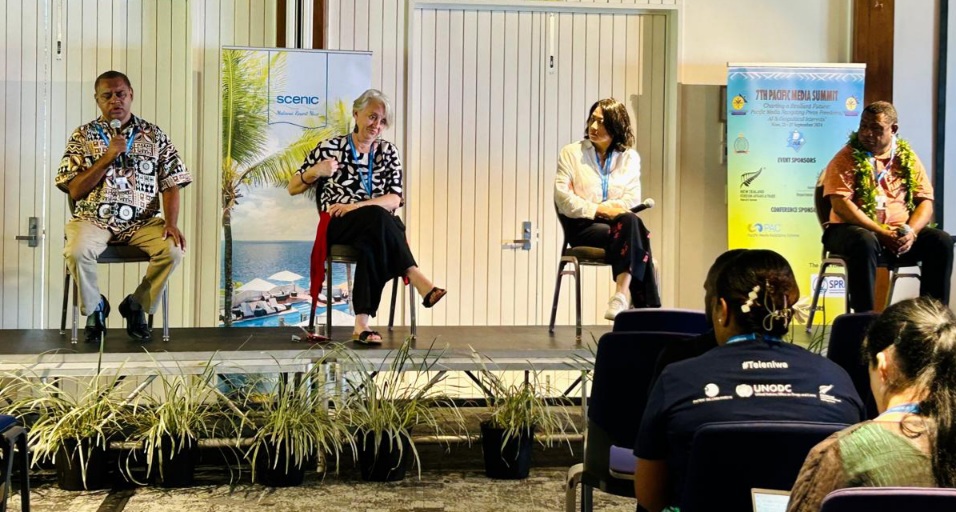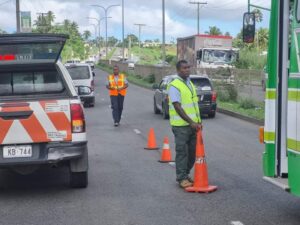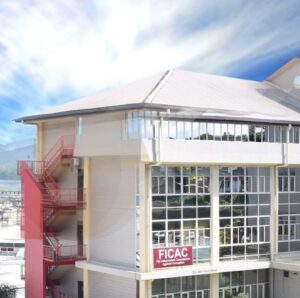The PINA Media Summit 2024 officially began today in Niue with Fiji’s media landscape front and centre, as stakeholders discussed the evolving challenges and potential solutions to secure the future of journalism in the Pacific.
Speaking as a panellist in Plenary Session 1 on Navigating Media Resilience Fijian Media Association (FMA) General Secretary and Mai TV Director Stanley Simpson highlighted critical challenges facing Fiji’s media sector and the broader Pacific including dealing with political pressure and most recently rapid changes in technology, and growing concerns around mental health in the industry.
One of the biggest turning points for Fiji’s media came after the 2006 coup. Journalists and editors found themselves under intense government scrutiny, with some even detained or silenced. For many in the industry, this was a harsh reminder of the dangers they faced while trying to keep the public informed.
“It was a very difficult time,” shared Simpson who experienced the era firsthand. “We had to be careful with every story we published. There was always that fear of getting a call or a visit from someone in power.”
Alongside political challenges, Fiji’s media had to adapt to the digital age. As more people turned to social media and online news, traditional media like print newspapers and TV faced a drop in readership and revenue. This forced many media outlets to rethink how they reached their audiences.
“For a long time, we relied on print, radio, and TV. But suddenly, everything was online. We had to move fast to keep up,” Simpson said.
To stay afloat, many media outlets have had to get creative. Some have started producing content specifically for digital platforms, while others are looking for funding from international donors to support their operations.
“During the COVID-19 pandemic, we had to pivot quickly,” Simpson said highlighting Mai TV’s experience. “We started focusing on social media, posting updates and videos because that’s where the audience was. It was tough, but it showed us how adaptable we can be.”
But despite these challenges, the media community is finding ways to adapt and push forward.
Looking ahead, there are new challenges on the horizon for Fijian media. Technology is changing faster than ever, with artificial intelligence (AI) and social media continuing to reshape how people consume news. This means that local media will have to keep innovating to stay relevant.
“AI could really change the game,” Simpson said. “Journalists will need to learn how to work with these tools, or risk being left behind.”
Speaking passionately on the need for investment, Simpson highlighted the critical role of technology, international partnerships, and securing external funding to ensure media organisations can survive in an increasingly fragile environment.
Simpson shared an example of how technology was leveraged during the Oceania Netball series in Fiji that was broadcast via New Zealand’s Live View, enabling Tongan families to watch the event at minimal cost.
“We charged very minimal costs, and they were able to watch Tonga celebrate its first regional Oceania Netball series win,” he said, highlighting that technological advancements are providing new opportunities for media organisations to reach wider audiences.
However, Simpson quickly pivoted to address more pressing concerns, particularly about the financial sustainability of media organisations in small Pacific markets. He warned of the potential collapse of local media, referencing the closures of major TV stations in New Zealand as cautionary examples.
“I sent copies of those clips of NewsHub and TV3 closing down to our Minister of Communications and Deputy Prime Minister, and said, ‘If we don’t act, or if we don’t talk about this and address it, this will start happening here.’ If we don’t act now, it will not be about keeping the media going. The conversation will be about trying to revive dead media organisations in the Pacific,” Simpson warned.
In terms of solutions, Simpson was clear—investment in infrastructure and production equipment is urgently needed. He acknowledged the support received from Australia and the Pacific Media Assistance Scheme (PACMAS), which has been crucial in keeping organisations like the FMA operational. However, he noted a disparity in aid distribution, pointing out that while millions are invested in military facilities, the media—often hailed as the backbone of democracy—receives comparatively little.
“You’re giving $20 million, $30 million, $60 million, you’ve built a $60 million Blackrock military facility and landed a $20 million ship that ended up on the reef within a month, and we’re getting less than 100,000,” Simpson said.
While expressing gratitude for existing support, Simpson urged donor countries to reflect their commitment to democracy and good governance by investing more substantially in media.
“They always talked about how the media is important to democracy, good governance, and accountability, but what they’re giving us is not showing us what we are worth,” he stated, calling for direct talks with funders to address these disparities.
One of the core issues Simpson raised was the increased external content in Pacific markets, with local stories often being overshadowed.
“Some of the programs that’s been done right now is just not working. There’s PACAUS TV, and some of it is just flooding more external content to us. We want our content shown. We want our story shown. We want to build the platforms to show it to the world,” he said.
Simpson proposed that stronger alliances and better access to international funding could help Pacific media navigate these challenges. He suggested that regional media associations should work together to create unified talking points when engaging with donors, a practice FMA operates by.
“I’m hoping to talk with other media associations here in other regions, and from work forward, we can have the same talking points across the Pacific,” he said.
Georgina Kekea, Editor of Tavuli News and PINA Board Member, moderated the session. The panellists included Kora Nou, Managing Director of NBC PNG and President of PINA, Irene Liu, Regional Director of the International Fund for Public Interest Media, and Mary Louise Callaghan, Project Manager for Transparent Pacific.
The summit is currently taking place at the Scenic Matavai Resort and will conclude on Thursday (local time).









